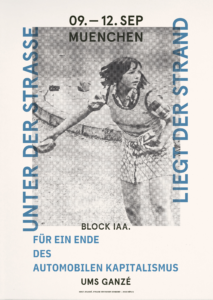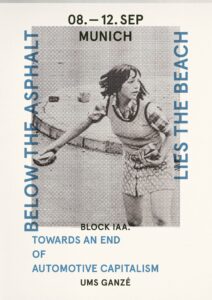Smash Capitalism, Block IAA
 Die Leistungsfähigkeit der deutschen Industrie wird bekanntlich nur vom Einfallsreichtum der deutschen Politik übertroffen. SUVs und Diesel-Gate, Waffenexporte und Braunkohleabbau, VW und BMW, Armin Laschet und Annalena Baerbock. Alles weltweit bekannte Gütezeichen deutschen Tatendrangs und Erfindergeistes: In liebevoller Verbindung zur Schau gestellt auf der diesjährigen Internationalen Automobil Ausstellung in München. Wer sehen will, was morgen bewegt, kann ihn dort bewundern, den neuen deutschen Exportschlager: E-Mobilität hurra, Klimaziele adé. Denn nur, wenn alles schön grün angemalt wird, bleiben wir Vize-Exportweltmeister der Herzen und dürfen den Porsche Cayenne behalten. Jetzt eben mit Lithium-Batterie.
Die Leistungsfähigkeit der deutschen Industrie wird bekanntlich nur vom Einfallsreichtum der deutschen Politik übertroffen. SUVs und Diesel-Gate, Waffenexporte und Braunkohleabbau, VW und BMW, Armin Laschet und Annalena Baerbock. Alles weltweit bekannte Gütezeichen deutschen Tatendrangs und Erfindergeistes: In liebevoller Verbindung zur Schau gestellt auf der diesjährigen Internationalen Automobil Ausstellung in München. Wer sehen will, was morgen bewegt, kann ihn dort bewundern, den neuen deutschen Exportschlager: E-Mobilität hurra, Klimaziele adé. Denn nur, wenn alles schön grün angemalt wird, bleiben wir Vize-Exportweltmeister der Herzen und dürfen den Porsche Cayenne behalten. Jetzt eben mit Lithium-Batterie.
Doch die automobile Zukunftsvision in grün ist nichts anderes als gelebte Dystopie. Eine Welt, die sich an kapitalistischem Wachstum statt an ökologischen Kipppunkten orientiert. Eine Welt, von der man sagen kann, dass sie verrückt ist, ohne eine andere zu kennen.
Autoland und -industrie müssen über die nächste Legitimierungsklippe gerettet werden, also präsentiert sich die sogenannte »grüne IAA« in München als Staatsbankett im E-Gewand. Doch kann kein Mobility-Theater darüber hinweg täuschen, wie deutsche Autoindustrie und Klimakrise made in Germany Hand in Hand gehen: beide manifestieren unaufhörlichen Wachstumszwang und aggressiven Standortnationalismus gleichwie spezifische Formen patriarchaler und neokolonialer Herrschaft. Gründe genug, sich mit ihr anzulegen.
Grünes Staatstheater im braunen Autoland
Mit freier Fahrt in den Klimakollaps – das zumindest scheint die Devise von Staat und Industrie in Deutschland zu sein. Da sich beider Allianz immerzu an kapitalistischem Wachstum orientiert, fällt ihre Antwort auf die Klimakrise erwartbar aus – selbst oder gerade wenn verheerende Flutkatastrophen im eigenen Vorgarten wüten.
Weil es Investitionsrisiken für deutsche Automobilkonzerne rasselt, wenn der nationale Vorzeigeschüler seine Hausaufgaben im Bereich »Green New Deal« nicht macht, stehen Wirtschaft und Politik unter Handlungszwang: genau dort soll die diesjährige Internationale Automobilausstellung Abhilfe schaffen. Während man dem emissionsreichen Verkehrssektor und damit auch der deutschen Automobilindustrie lediglich eine neue Antriebsart verpasst, treten Söders und Habecks mit heimatpolitischen Klimaschutzprogrammen zur Wahl an. Und: die neue schwarzgrüne Wähler:innenschaft applaudiert.
Wenn deutsche Politpromis dann beanstanden, dass Maßnahmen zum Klimaschutz die nationale Wettbewerbsfähigkeit nicht gefährden dürften, steht diesem Anspruch all jene Gewalt ins Gesicht geschrieben, die vom freien Markt mit Musk’schen Marsvisionen geschmückt wird. Schließlich ist es so viel unterhaltsamer, das voll-automatisierte, luxuriöse Mars-Leben zu imaginieren, als sich die Laune am Mittagstisch mit nationalökonomischen Grenzregimen und den dazugehörigen ökologischen Auswirkungen zu verderben. Für diese Retter:innen im Kampf für die deutsche Wirtschaft ist der globale Süden nur dann von Interesse, wenn er Absatzmärkte und Rohstofflager für deutsche Autobauer:innen bereit hält. Gütesiegel der Vize-Exportweltmeister:innen war und bleibt es, lokale Ökonomien wie Lebensgrundlagen zu ruinieren und den direkten Raubbau an der Natur als notwendig zu verklären. Der Markt regelt – und konkurriert nieder, wo sich koloniale Kontinuitäten in stets neuen Herrschaftsformen aktualisieren: Weltgegenden, die als ehemalige Kolonien niemals eine wettbewerbsfähige Ökonomie aufbauen konnten, sind nun auch Austragungsort der Klimakrise made in Germany.
Schöne neue Betonwelt
Nothing to lose?
Doch munter läuft das Malen der one green world. Standortnationalismus ist dabei ideologischer Kit von Grünen bis AfD, geschäftsmännische Handshakes mit der deutschen Schlüsselindustrie vorm neuen E-Mobil inbegriffen. Da die Überwindung der Autoindustrie dem deutschen Wirtschaftsmodell den Treibstoff nehmen würde, fliegen Maßnahmen zum Klimaschutz vom Tisch und serviert wird eine neue Antriebsart: E-Mobilität, Deutschland liebt dich. Waren bis vor kurzem Verbrenner-SUVs noch der Kassenschlager, gilt die Umstellung auf Batteriebetrieb inzwischen als besiegelt. Denn an Abgas-Grenzen, moralischen Konsument:inneninteressen und der bevorstehenden Öl-Knappheit führt selbst für den Krisengewinner Deutschland kein Weg vorbei. Während Tesla die deutsche Autoindustrie blöd darstehen lässt, ist der Kampf zwischen Diesel-Faschos und Elektrojüngern hierzulande staatsmännisch geklärt: es rasselt direkte Investitionen in Unternehmen, Käufer:innenprämien und Ladeinfrastruktur. Die neue Antriebstechnologie soll den deutschen Autokonzernen aus der Patsche helfen – öffentlichkeitswirksam und mit großem Tamtam: Schließlich rettet man hier gerade die Erde!
Doch gerettet wird rein gar nichts, im Gegenteil, mit der Klimazerstörung werden ordentlich Profite gemacht. Der Verkauf des E-Autos als »nachhaltige Zukunftstechnologie« ist marktlogisch der nächste Schritt, um das klimazerstörerische Geschäft der Autoindustrie neu zu legitimieren. Allein die Produktion von E-Autos verursacht nochmals deutlich höhere Emissionen als die Herkömmliche. Für die Batterien wird der seltene Rohstoff Lithium benötigt, dessen Abbau enorme Wasserverschmutzung verursacht und die Ausbeutung natürlicher Ressourcen machtpolitisch verlängert. Während sich das geopolitische Interesse an Öl-Feldern also auf die Lithium Vorräte in Südamerika und im Kongo verschiebt, ändert die E-Mobilität am Prinzip des Extraktivismus: nichts. Das Elektroauto ist nicht die Lösung des Problems, es ist nur dessen Fortsetzung mit grünem Anstrich.
Kämpfen in einer Welt in Flammen
8.–12. September MUENCHEN
Smash Capitalism, Block the IAA
 It is well known, that the efficiency of the German industry is only surpassed by the ingenuity of German politics. SUVs and Diesel-Gate, arms exports and coal mining, VW and BMW, Armin Laschet and Annalena Baerbock. All of these are expressions of German drive and inventiveness, and will be lovingly displayed at this year’s International Motor Show (the IAA Mobility) in Munich. Anyone who wishes to see what will move tomorrow can admire it here, the favorite new export: e-mobility. So hail to the big new electric vehicles, and goodbye dear useless climate goals. Because only if everything is nicely coated in green ideology without actually changing the way we interact with the earth, will webe able to remain at least the vice world export champion and be allowed to keep our little Porsche Cayenne. Now with a lithium battery.
It is well known, that the efficiency of the German industry is only surpassed by the ingenuity of German politics. SUVs and Diesel-Gate, arms exports and coal mining, VW and BMW, Armin Laschet and Annalena Baerbock. All of these are expressions of German drive and inventiveness, and will be lovingly displayed at this year’s International Motor Show (the IAA Mobility) in Munich. Anyone who wishes to see what will move tomorrow can admire it here, the favorite new export: e-mobility. So hail to the big new electric vehicles, and goodbye dear useless climate goals. Because only if everything is nicely coated in green ideology without actually changing the way we interact with the earth, will webe able to remain at least the vice world export champion and be allowed to keep our little Porsche Cayenne. Now with a lithium battery.
The automotive vision of a green future is just another version of dystopia. A society guided by never ending capitalist growth instead of ecological tipping points. A world that we believe to be crazy, without knowing any other.
To make sure that the the car industry and the entire car-dependent country can continue on the ruinous path, the so-called „green IAA“ in Munich presents itself as a state banquet for e-mobility, and offers legitimacy to a destructive sector. But no motor show, however glamorous, can hide, that the German industry works hard in the field of production and enhancement of the climate crisis: Here we can see, how continuous growth compulsion and aggressive nationalism as well as specific forms of patriarchal and neocolonial structures are upheld. These are reasons enough to take on the IAA and the German automotive industry.
Green State Theater in Brown Car Country
A straightforward drive into the collapse of the climate – at least it seems like that’s what the government and industry in Germany is aiming for. Since the alliance between the two is always oriented toward capitalist growth, their helpless and at the same time aggressive response to the climate crisis is predictable – even though devastating floods are raging through their own country.
Because it rattles investment risks for German automotive companies if the nation’s poster child fails to do its homework on the „Green New Deal,“ business and politics are under pressure to act: that’s precisely where this year’s International Motor Show is intended to remedy the situation. While the high-emission transport sector and thus also the German automotive industry are merely being given a new type of drive, politicians from Söder to Habeck are running for election with domestic climate protection programs. And sadly, the voters of the conservative and green party are applauding.
When German political celebrities remark that climate protection measures may not endanger national competitiveness, this claim shows the violence that is adorned by the free market as with Elon Musk’s visions of Mars. After all, it is so much more entertaining to imagine the fully-automated, luxurious life on Mars, than to have one’s mood spoiled with talk about national economic border regimes and the associated ecological consequences. For these valiant warriors in support of the German economy, the global South is only of interest, if it provides sales markets or raw materials for German carmakers. The prime compentence of the vice world export champion was and remains to be: ruining local economies and livelihoods while glorifying overexploitation of nature as necessary and therefore acceptable. The market regulates and makes sure that German domination of postcolonial areas is actualized in ever new forms: Regions of the world that, as former colonies, were never able to build up a competitive economy, are now also the venue for the climate crisis made in Germany.
Brave New Concrete World
While the state’s nationalism sorts out the infrastructure and the labor market, BMW, VW et. al. deliver a blatant vision of the future: „See what moves tomorrow.” Corporations that widely manipulated emission tests only a few years ago, now stage themselves as the solution to the climate crisis at the IAA in Munich. For almost a week, the entire city will be subject to the industry’s PR-stunt. Half of the city center is turned into spaces exhibiting greenwashing, hoping that the public will endorse the project. These so-called open spaces are linked to the exhibition grounds via the „blue lane“ – a test track for the new „sustainable“ e-vehicle monsters.
But you don’t need the IAA’s witless claim to see what the proud automobile state creates: Horrendous amounts of money are poured into the construction and maintenance of a pivotal piece of German heritage: The Autobahn. The countryside is leveled, cities and forests are turned into concrete planes. The so-called car-friendly city is transforming contested public space into automotive property. It is the subjugation of our lives to automobility; it is patriarchy coagulated into asphalt. Because car-oriented urban planning is oriented towards the male work relationship and not towards reproductive work, it builds many and, above all, fast routes between the place of residence and the (male) workplace. It is thus just another facet of binary gender separation.
Nothing to lose?
But the painting of the one green world continues unabated. Under this new slogan, nationalism for the sake of protecting the German econony is what all political parties from the Greens to the Nationalist AfD can agree on, while giving handshakes to the German key industry in front of the new E-mobile. Overcoming the auto industry would take the power out of what the German economic model, so serious climate protection measures are options that are not seriously discussed. While until recently internal combustion SUVs were the best selling vehicles, the turn to battery operated mobility has now been decided in favour of e-mobility. This is because there is no way around exhaust gas limits, moral consumer interests and the impending oil shortage, even for Germany. While Tesla is making the German auto industry look silly, the battle between old diesel fascists and electric disciples in this country has been settled in a statesmanlike manner: direct investments in companies, buyer premiums and charging infrastructure are handed out generously. The new technology is supposed to bail out the German car companies – with a lot of publicity and hoopla: After all, now it’s the car industry saving the planet!
But nothing at all is being protected; on the contrary, profits are made from the destruction of the climate. Selling the e-car as a „sustainable technology of the future“ is the next step in a market logic to re-legitimize the climate-destroying concept of individual, automotive transport and its industry. The production of e-cars causes significantly higher emissions than conventional ones. At the moment, the batteries require the rare raw material lithium, the mining of which causes enormous water pollution and prolongs the exploitation of natural resources in terms of power politics. So while geopolitical interest shifts from oil fields to lithium deposits in South America and the Congo, e-mobility changes nothing in the principle of extractivism. The electric car is not the solution to the problem, it only prolongs and enhances it.
Fighting in a world in flames
But why paint green what has long been on fire? A realistic answer to the climate crisis is not to be found in the „just keep on doing what you’re doing“ of the German auto theater. It is clear for us, that if the state and capital pass the baton to each other, a real mobility turnaround can only be fought for from below and against these alliances. As comprehensive as the seizure of the city of Munich by the automobile industry will be in September, so are the reasons to mess with this close alliance and their showmanship. And this complex show offers a multitude of ways, to interrupt and destroy the show!
If German car companies dare to stage a green Munich Mobility fairy tale in the middle of the escalating climate crisis, we will turn it into a disaster: E-car parties are no reason to celebrate, blocking them is just the beginning! Our answer to the black-green agenda of the IAA 2021 is: Overcome car capitalism, for the socialization of production and mobility, in urban as well as rural areas. Beneath the asphalt lies not only the beach, but also a society based on solidarity – Let’s dare to fight for it!
Smash Capitalism, Block the IAA.









